Atoms have no color
All that we call Reality, it is actually interpretation.
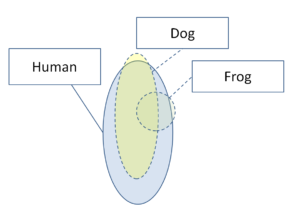
The visible spectrum, the audible spectrum and other perceptible spectrum are different depending on the being who perceive it. For example, are different depending on the species. A human, a dog or a frog do not perceive the reality in the same way. For everyone, the reality is different.
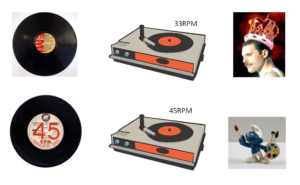
The universe is like a vinyl record in 3D (or more dimensions) and for each one of us, conscious / sentient beings, the universe is different, because we interpret it differently. There are as many interpretations as vinyl players. “A kind of magic” by Queen is heard as we remember it with a 33 RPM player, but if we play it in a 45 RMP it will sound as if The Smurfs sang it. We can imagine countless players, generating different listening experiences for the same vinyl. In fact, there could be a player in which “A kind of magic” by Queen will be heard as “Trapped in a Corner” by Death.
In this text I will argue that the objective world might not exist, and that if it exists, is only relevant on a small local scale, but not essentially relevant, and in fact it is as if it did not exist.
I will call the “objective world” the (supposed) Real and unique world that generates the subjective experiences, which is perceived with greater or lesser detail and precision. This world is also called “material world”. It is said that the material and objective world generates subjective experiences, not only because, for example, the atoms of the chair (material) “out there” generate in me the subjective visual experience of a chair, but because, for example, the configuration of some the atoms of my body (material), organized as an endorphin (along with other atoms also organized in specific ways) generate subjective (pleasurable) experiences.
Assuming the existence of an “objective world” / Real world / “material world” implies supposing that there exists a unique reality “out there” which we perceive partially and sometimes distorted. It is said that objective world is the one that generates the subjective experiences.
I believe that, on the one hand, the objective world may not exist (A). And on the other hand, even existing, is fundamentally irrelevant (B). I will develop both arguments separately, and then some counter-arguments.
(A) How could the objective world not exist?
If our universe were a simulation, it would not be necessary to simulate the entire physical universe, but only that part to which a sentient being could access. That is to say, the material universe could be being created as we explore it. For reasons of efficiency, it would be reasonable to do so. But why stop at that point? If our universe were a simulation, it would not really be necessary to simulate absolutely nothing of the physical world. It would be enough to simulate our experiences, including our experiences of the physical world. The objective physical world may not exist.
We do not need to admit that the universe is a simulation to have reasonable doubts about the “strong” existence of a material world or objective world. It is intuitive to think that a certain combination of matter produces (the emergence of) the “I”. But in a completely symmetrical way we could also say that a certain combination of basic experiences produces (immersion in) the “I”. In the first case, the matter creates the “I” and the “I” experiences the existence of experiences. In the second case, the basic experiences create the “I” and the “I” experiences the existence of matter. Emergentism and immersionism are symmetric hypotheses about reality, and although the former is more intuitive, there are no good reasons to discard the second.
(B) Why, if it exists, is the objective world fundamentally irrelevant?
Suppose it is true that there is an objective world “out there”.
In the following figure, the circle represents all your possible experiences. The points that are inside the circle symbolize each of the possible sensations, perceptions and other experiences that you may have. The points outside the circle represent impossible experiences for your nervous system.

In this figure I have represented your circle of experiences and mine. They are very similar. With a few exceptions, in general we perceive the same kind of things, and we react similarly to the same stimuli. This is because we have brains, eyes, ears etc. very similar.

This way we could represent the possible experiences of all human beings. They are very similar but there are still differences. Our different perceptions and especially our different reactions to the same stimuli are of our utmost interest.
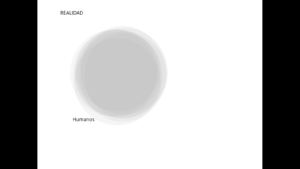
If we add another animal species from the planet Earth we could have something like that.
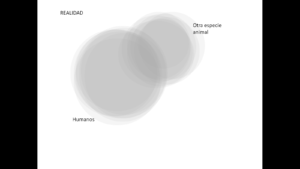
The experience of a bat would be very different from that of a human. Let’s imagine the experiences of an ant. Or an amoeba.
By adding other species (maybe extraterrestrials but it can even happen with some non-aliens) it could happen that these experiences have nothing to do with ours.
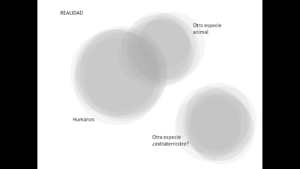
It is expected that this is the case, producing the phenomenon that the supposed objective reality is indifferent because between one and other beings, their “vinyl players” are so different that the supposed objective reality, even existing, has absolutely nothing to do between each other, since it is interpreted in totally different ways, and at different physical, temporal, etc. scales.
In the following figure the orange circles represent what different species could agree to call “objective world”. Thanks to the similarities that we humans have with, for example, bats, our circles come together, and we could expand our concept of “objective world” by uniting both circles. In fact, this is what we do when we communicate with machines capable of detecting ultraviolet and infrared light: we extend our concept of “objective world” assuming that there are things that we can not perceive thanks to the fact that others do. But for other species or beings very different from us, our concepts of “objective world” could be so different that they even have nothing in common (orange circles do not touch).
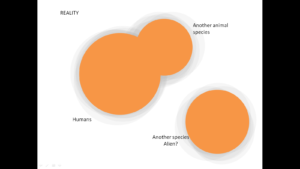
We could think that there are no beings so different from us that their perception of objective reality is so different from ours, but the problem is that up to now we identify other subjective beings only through the similarity with us, that is, only those that are similar to us, that is, we are having the bias of the the problem of the streetlight effect: We do not look for the keys where they are most likely to be, but where we most likely can find them. In the same way, habitually we do not look for sentient beings where they are most likely to be, but where we are most likely to recognize them.
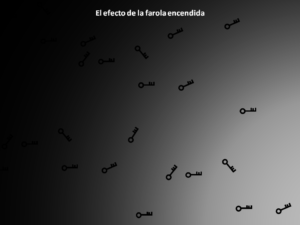
I am not saying that, if it exists, it is not interesting for us to know what it is that we call the objective world. Precisely, that’s what science is dedicated to. What I am saying is that seen in a broad perspective, the true objective world is practically irrelevant, being the relevant the configuration of the players or interpreters.
Someone could say that reality is ultimately material, composed of atoms, and that knowing the disposition and behavior of these atoms is interesting for all kinds of beings, however different they may be. But what I want to explain here is that for other beings atoms may not even exist, and their experiences could be generated in ways unimaginable to us. This seems to me the most plausible, and the risky thing would be to suppose the opposite, in the same way that to think that there are other planets inhabited by intelligent life forms is the most plausible and the risky thing would be to think otherwise.
That is, the material world, if it exists, is absolutely fundamental for individual beings and for groups of beings that are similar to each other… at least if we are talking about that thing these beings call the material world. But seen in perspective, the objective world or the true material world is basically irrelevant, at least if we compare it with the importance of the interpreters or reproducers. The real material world, if it exists, may be just pure randomness, being all that we perceive the result of our configuration as interpreters.
Counter-arguments
I think the hypotheses shown are interesting and with them promising lines of research can be developed, but there are good arguments against them. I will summarize what I think are the best counter-arguments.
(A) On the non-existence of the objective world
Does it really make sense that there is a player in which “A kind of magic” by Queen is heard as “Trapped in a Corner” by Death? Let’s call A “A kind of magic” and T “Trapped in a Corner”. So that when receiving A as input is heard as T, the player should always add to the input signal T-A, so that A + (T-A) = T. What evolutionary meaning has the existence of an object that adds the T-A signal to every signal that it receives? Surely none.
Assuming that the world is a simulation, although it is true that it can be more efficient to create physical reality only as it is being explored, it seems an unnecessary complexity, unless the physical world can be created progressively following infinite patterns simple, apparently random, such as fractals or Conway’s “Look-and-See” or “audio-active disintegration” series. In general, game programmers do not do this. Instead, they create worlds with well-defined limits, such as in our case, the speed of light or the Plank constants (Plank time, Plank length …). On the other hand, effectively, it would be enough to simulate the experiences; there is no need to simulate the physical world. But given that the experiences are so convergent, the really efficient thing would be to simulate the existence of an objective physical world together with similar interpreters, with small differences. I believe that a counter-counter-argument still valid here is the light lamp principle: perhaps the experiences are not so convergent, and what happens is that we are only able to identify as sentient beings those whose experiences are convergent to ours.
The development of the criticism of immersionism is practically the same. Immersionism has a beautiful symmetry with emergentism, and indeed, the only things we are sure about are the subjective experiences, so it is reasonable to think that our identity is basically composed of experiences (strong reality), and despise the material world as a weak reality or epiphenomenon. However, in that case, why are the experiences related to the existence of the material world so convergent? Would it not be reasonable to think that the material world has a strong existence independent of experiences? And even that the material world is that he generates the world of experiences (that is, emergentist materialism) and not vice versa (that is, immersionist spiritualism)? Again, a valid counter-argument, I believe, is the principle of the street lamp: perhaps the experiences related to the material world are not convergent but rather random, and yet what happens is that we are only able to share experiences relating to the material world with sentient beings whose experiences are convergent with ours because with others we have no way of communicating.
(B) On the fundamental irrelevance of the objective world
In this case it is assumed that it is true that there is an objective world “out there”, and it has been argued that this objective world is, seen in a global way, fundamentally irrelevant.
In argumentation, we are really talking about two types of “objective world” (or an evolution of this concept). There is a consensual or local objective world (orange circles, for each species) and a global objective world (the total orange surface). As we know how the perceptions of others are, we can expand what we consider the global objective world. The argument presented seems to indicate that as this happens, the orange surface will grow to cover the entire space of possibilities. However, this does not necessarily have to be the case. Although the global objective world is extraordinarily larger than we can suppose or imagine, it does not necessarily have to be infinite, that is, it does not necessarily have to cover all possibilities and therefore knowing it would not be irrelevant in any way. I believe that, again, a valid counter-argument is the principle of the street lamp: there may be a limit to our ability to understand or accept the objective worlds of other beings very different from us. Both hypotheses are plausible: the global objective world could cover the entire space of possibilities, or not do so.
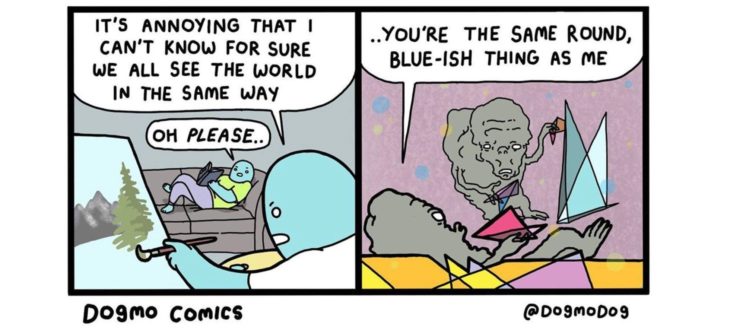
https://www.npr.org/sections/13.7/2016/09/06/492779594/what-if-evolution-bred-reality-out-of-us?t=1596526524620&t=1596526654864